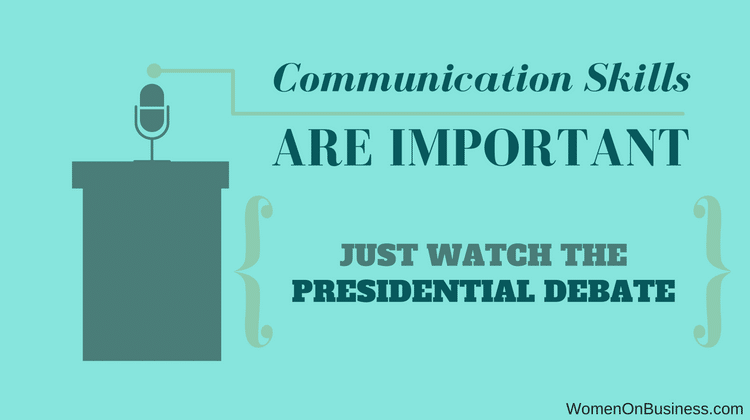
In the words of presidential candidate Hilary Clinton, “Words matter when you run for President.” They also matter when you are a woman in business seeking to make your mark on the world.
If you question the impact that communication skills can have on your professional future, do yourself a favor and watch the presidential debate. Presidential debates prove this: your intellectual competence and professional experience don’t mean a thing if you can’t win your audience over with your words.
In a game where every word you say can be used against you and everything you don’t say can be used to deplete your confidence, you have to be verbally skilled and mentally swift.
You never know when your performance will be nationally televised or used to determine your worthiness for the opportunity that you seek. Here are four ways to enhance your communication skills.
1. Be Clear
Don’t be all over the place with your message or you will lose people’s attention. Make sure that you present a clear and concise message that can be easily understood by others.
Think about the question. Pause. Then, present a response that ties in your personal beliefs with supporting information. At the end of your response, others should be able to summarize your views and identify the main points that you were aiming to make.
2. Be Comfortable While Speaking Extemporaneously
Let’s face it. Speaking on the spot is tough–especially when you know that millions of viewers are judging every word you say. The key to speaking extemporaneously is knowing how to use all of the information you have at your disposal, while connecting the dots as fast as you can.
In order to enhance your impromptu speaking skills, you need to make sure you do your homework: find out as much as you can about your key topics and identify potential questions that could be asked. Although you can’t prepare for every question that may come your way, you can put your best foot forward by appearing to be a knowledgeable and informed person.
3. Watch Your Non-Verbal Cues
Your body language can reveal more than words ever can. This was evident during the first presidential debate between Donald Trump and Hilary Clinton; you couldn’t help but notice insincere smiles, palms waving back and forth, fists shaking, and questionable frowns displaying constant disapproval. And it was all captured for the world to see and form their own opinions about.
You’re not exempt from this judgment. People are creating assumptions about you based on the moves that you make, so make sure you leave a powerful and poised impression. Record yourself so you can be aware of the messages that you are sending through your non-verbal cues. Nine times out of ten, you had no idea that your face turns up and eyes bulge out of your head when certain comments are made.
4. Choose Your Words Wisely
The old “sticks and stones” saying doesn’t hold true anymore. Words have caused friendships to end, employees to become fired, and our country to become divided. You want to make sure you are using the right words to connect with your target audience.
You also want to avoid using the wrong words. Using ahs, ums, and you-knows will diminish your credibility faster than you can accidentally make a non-verbal gesture. You’ll immediately give people something to talk about–or leave others snoring because you couldn’t hold their interest.
No matter what industry you are in, people are judging the quality of your communication skills. Either you can save yourself some time and stress later by learning from the presidential debate, or you can risk not getting the opportunity of your dream because you are in an unfortunate state of denial about the importance of communication skills. You decide.


Hi Charlene
Communication is so very important, the skills of which we are never taught. We are expected to learn through our observations of and experiences with parents, friends, teachers and others who influence as we are growing up. The 4 points you have identified are so important when one is a speaker, presenting their perspective. We each have our own unique perspectives on everything and if we are share these with others, the skills you have identified are necessary to help others listen to what we have to say. Thanks so much for identifying these 4 communication skills.